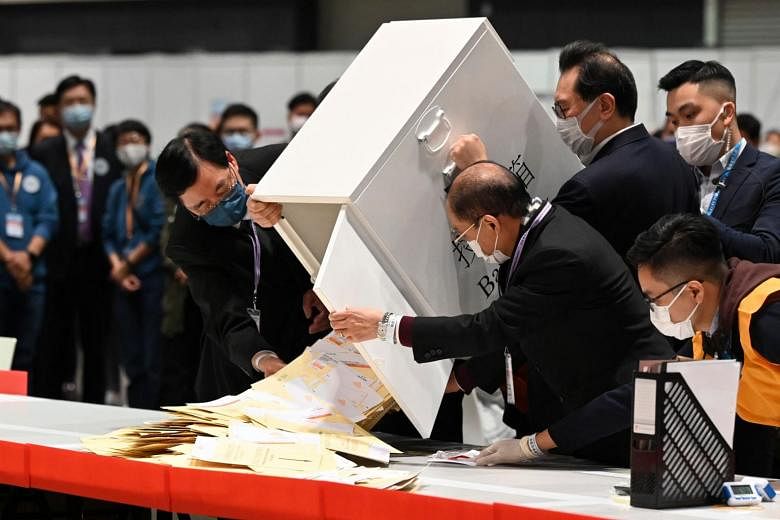HONG KONG - The city's new Legislative Council (Legco) has been formed following Sunday's (Dec 19) election in a "patriots-only" system that drew a record low turnout.
The Electoral Affairs Commission (EAC) said early Monday that 30.2 per cent, or at least 1.3 million out of 4.5 million, of eligible voters cast their votes to choose the 20 candidates they want in Legco.
This was the lowest rate of not only the period since the city’s 1997 handover to China, but also during the British colonial era.
The lowest turnout rate for the Legco election was previously 35.8 per cent in 1996, a year before the handover.
After the handover, the average voter turnout rate in the past six Legco elections was 51 per cent.
It peaked at 58 per cent in the last election in 2016, two years after the Yellow Umbrella movement where student protesters occupied the Central district as they demanded universal suffrage.
Chief Executive Carrie Lam, who said she was "satisfied with this election", said a high turnout rate based on polarisation as seen between the blue and yellow camps in 2019 "is not something we should be glad of".
Likewise, a high turnout rate that is based on candidates smearing one another or using violence to sabotage other candidates' campaigns does not advance democratic development in society, she said.
She noted that Hong Kong does not have a mandatory registration and voting political system but even then, there were 4.5 million registered voters, which represents 92.5 per cent of eligible voters.
This is higher than 2012's 73 per cent and 79 per cent in 2016.
"The number of registered voters is a record high," said Mrs Lam, who added that the new Legco will be able to solve the city's housing crunch and improve livelihoods.
She went on to say that there will be a lot of criticisms and allegations against this particular election.
In a reference to a White Paper issued by China's State Council Information Office on Hong Kong's democratic progress, Mrs Lam noted that, as the report had stated, "there is no international standard that applies to everywhere in the world".
She said: "There is no one-size-fits-all and there is no superior democratic system.
"Our democratic development should be in line with our constitutional order under the 'one country, two systems'."
Mrs Lam said the ultimate goal to have universal suffrage to return the chief executive as well as the formation of Legco, have been set out in the Basic Law - the city's mini-Constitution.

Central authorities had previously tried to advance the democratic system, she said, but legislators who claimed to be democrats "scuppered the plan", "dragging the feet of our democratic development".
The silver lining is that Hong Kong is now "back on the right track" with an improved system to ensure patriots govern the city, concluded Mrs Lam.
The Hong Kong leader will set off to Beijing on Monday night to give a full account of the state of affairs in the city.
Direct election was held for only the 10 geographical constituencies that had only 20 seats.

A total of 153 candidates were fighting for 90 Legco seats, of which 30 were from functional constituencies and 40 from the Election Committee constituency.
The highest voting turnout was in New Territories South West at 31.67 per cent, while the lowest was 27.58 per cent from New Territories South East.
Electoral Affairs Commission chairman Barnabas Fung said that about 17,000 Hong Kongers living in the mainland voted at the three polling stations at the border, and 53 voted in the Penny's Bay quarantine centre.
The pro-establishment camp had fielded the majority of the candidates and dominated the Legco race as key pan-democratic parties skipped this election.
The dozen or so candidates who say they are not pro-establishment have failed to win any seats in the geographical constituencies.
Instead, the Democratic Alliance for the Betterment and Progress of Hong Kong (DAB), which fielded 22 candidates - the highest in the pro-Beijing camp - dominated the direct elections with its candidates winning in each of the 10 constituencies.
Over in the functional constituencies, the voting rate was 32.2 per cent, with social welfare, education and medical and health service sectors having the lowest turnouts.
More than 98 per cent of the 1,448 members had voted in the Election Committee constituency.
The Election Committee results were announced at around 2.30am on Monday and were the first to be made public in this year's polls.
There were 51 candidates fighting for 40 Election Committee seats in Legco.
All nine incumbent lawmakers were re-elected. They include DAB's Mr Horace Cheung and Ms Elizabeth Quat, the Hong Kong Federation of Trade Unions' Mr Michael Luk and Ms Alice Mak, the New People's Party's Ms Eunice Yung, and the Business and Professionals Alliance's Dr Priscilla Leung who had the most votes at 1,348.
Some of those who did not win a seat in the Election Committee constituency are former civil servant Mike Rowse, Phoenix TV journalist and programme host Vie Tseng, as well as tycoon Allan Zeman.
This is the first Legco election after an electoral overhaul approved by the Hong Kong government in May.
The overhaul meant that any candidate running in Hong Kong elections must be cleared by a dedicated screening committee and certified a patriot before he can run.


